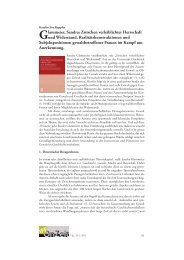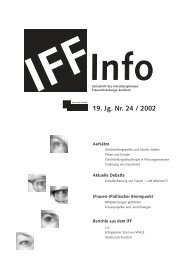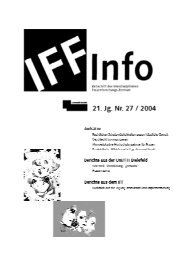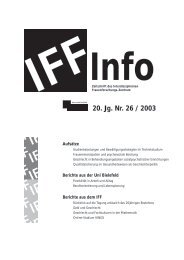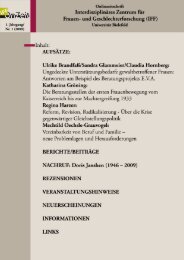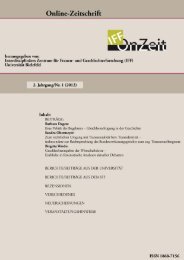IFF Info Zeitschrift des Interdisziplinären... - IFFOnzeit
IFF Info Zeitschrift des Interdisziplinären... - IFFOnzeit
IFF Info Zeitschrift des Interdisziplinären... - IFFOnzeit
- Keine Tags gefunden...
Sie wollen auch ein ePaper? Erhöhen Sie die Reichweite Ihrer Titel.
YUMPU macht aus Druck-PDFs automatisch weboptimierte ePaper, die Google liebt.
<strong>Info</strong>son governmental capabilities and transnational strategiesto correct processes of exclusion. We would liketo discuss:a) which kinds of masculinities and femininities /gender constructions are used in the <strong>des</strong>ign of exclusionarypolitics (e.g. in legitimising the depreciation ofhuman rights),b) what consequences global and national processesof exclusion have on women and men, particularly incombination with other hierarchical dimensions suchas nationality, class, and race, andc) if and how feminist projects and strategies can contributeto resist exclusion and promote social justicewithin and beyond national borders.Contributions may be dedicated (but not limited) tothe following sets of questions:a) Gender constructionsHow are the diverse interests of women representedin debates on crisis and political reform? Is a „women’sperspective“ strengthened at all, or is it subordinatedto „more pressing“, economic or security issues? Inhow far does the crisis produce new images of menand women (e.g. male Opel-workers fighting for theirrights; migrant female cleaners „<strong>des</strong>troying“ wages; lazyunemployed men; victimised single mothers on welfareetc.)? How do international politics and national policies,for example security policies, contribute to theconstruction of men and women, especially in combinationwith „own“ and „alien“ cultures? How do notionsof male foreign fundamentalists or foreign subordinatedand submissive women influence the selfconstructionof male and female identity in postindustrialisedsocieties?b) Gendered consequences of global and national processesof exclusionHow can the new processes of exclusion be characterised,and how do they affect men and women indifferent contexts? What impact does the globaldivision of labour have on gender relations within differentnation states? To which degree do men andwomen living in OECD states benefit or suffer from it(e.g. as textile and steel workers losing their jobs due tohigh domestic wage levels, or as illegal immigrants beingde-qualified and forced to perform cheap domesticwork)? How are gender relations affected in the homecountries of migrants (e.g. „care drain“ based on globalcare chain)?How do the political reforms in Germany and otherOECD states affect gender relations? Does thetransformation mean an unequivocal backlash forgender equality or does it provide some potential fornew and emancipatory gender roles? What canfeminists contribute to a gender-sensitive reform ofthe welfare state?How can a critical perspective on national processesof exclusion consider more severe forms of deprivationin other parts of the world? How can these be seen asanalytically and politically connected phenomena?c) Transnational visions and strategies for feministpoliticsWhich ideas of global justice have transnationalfeminist activists developed? How have they related toglobal standards, how do they estimate their usefulness(e.g. CEDAW, the BPFA and human rights standardsin general)? Were they successful in linking global standardswith specific contexts, and what are the obstaclesin such strategies?What is the potential/ organisational strength oftransnational feminist movements? How strong are, onthe other side, transnational movements that promotegender differences and –hierarchies?How can processes of exclusion that are not easily attributedto either the national or the international levelbe analysed and confronted?Abstracts are welcomed in English and German andshould not exceed two pages. Please send your proposaluntil November 30, 2005 to:Institut für Europ. EthnologieGraduiertenkolleg, Dr. Bettina RoßBiegenstr. 9, D – 35037 Marburg / Germanyross@staff.uni-marburg.deSubmissions via email are preferred.142



